 Famous Lanzhou beef noodles
Famous Lanzhou beef noodles Armed Police hold anti-terrorism drill in SE China's Xiamen
Armed Police hold anti-terrorism drill in SE China's Xiamen Harbin Int'l Ice and Snow Festival opens
Harbin Int'l Ice and Snow Festival opens 'Jin' named the word of the year by cross-strait netizens
'Jin' named the word of the year by cross-strait netizens Chinese scientific expedition goes to build new Antarctica station
Chinese scientific expedition goes to build new Antarctica station
 Chinese naval escort fleet conducts replenishment in Indian Ocean
Chinese naval escort fleet conducts replenishment in Indian Ocean 17th joint patrol of Mekong River to start
17th joint patrol of Mekong River to start China's moon rover, lander photograph each other
China's moon rover, lander photograph each otherUNITED NATIONS, Jan. 8 -- Citing complexity, security and weather, the head of the joint UN-Organization for the Prohibition of Chemical Weapons (OPCW) mission charged with ridding the munitions from Syria said Wednesday though the operation has been delayed, it is expected to meet its June deadline.
After briefing members of the UN Security Council on the mission's progress, Sigrid Kaag, the Dutch diplomat heading the program, was asked if she reported the operation was on schedule.
"I didn't say that we are on schedule, but I think that what we talked about is a collective expectation by the Security Council .. . looking at the June deadline, that there's no reason to assume that delays should occur, all things being equal," she replied. " We also have to remember that Syria is a country at war; the security situation can shift day to day but everything is ready; investment has been made and authorities have shown that first movements have started to happen."
It was announced Tuesday the first consignment of priority chemicals were loaded onto a Danish vessel in the Syrian port of Latakia which then moved out to sea to await additional chemicals. Later they were to be taken to as yet unannounced ports for trans- loading to a U.S. naval ship for destruction at sea through hydrolysis.
In relating "an assessment of the complexity" she gave the council, Kaag told reporters that "It is an unprecedented effort. It is noble under very sad circumstances and that always needs to be remembered, a very challenging in-country situation. Security is big factor in all that takes place," while reminding that the Syrian government is charged with security of the mission.
More than 100,000 people have died in the conflict and millions more displaced, including more than 2 million of them as refugees.
"Security when it comes to access to sites -- getting caught in crossfire, direct fire, indirect fire -- is a concern for the joint mission," she said. "It is also a concern for the authorities who are responsible for the safety of joint mission personnel."
"When it comes to logistics we've had supplies arrive from different places, different member states," the mission chief said. "The detail in this exercise is almost like a supply chain management exercise."
She explained that many items need to come from different countries, traveling through Beirut, capital of Lebanon, where "we were affected for a few days by a customs strike" and snow. "When it snows in Syria or in Lebanon or the Holy Land it can actually paralyze the whole infrastructurial system," Kaag said. "The countries are not used to that; not to that severity."
Adding all the factors, she regarded as a "still remarkable achievement that almost everything is in country, is being prepositioned and is already being used and hence the first movement could actually take place."
Declining to rate cooperation by the Syrian authorities, Kaag called it "constructive cooperation," marked by "frequent meetings, preparation cooperation for site visits, access to staff, so it is constructive in all measures, but I don't rate it."
When asked about where ships eventually will head with chemicals from chemical weapons, she said "priority one chemicals . .. will be destroyed onboard a U.S. vessel by means of hydrolysis. Priority two chemicals will be going to two different countries, subsequent to these countries having tendered with OPCW for commercial destruction so those destinations are not known."
"Italy has offered a port where trans-loading will take place," Kaag said. "That is all that is useful to know and out in the public domain and I think it paints a picture of complexity."
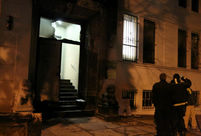 Chinese Consulate General in S.F. burned for arson attack
Chinese Consulate General in S.F. burned for arson attack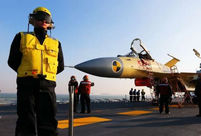 Roar of J-15 fighter is melody for operator on the Liaoning
Roar of J-15 fighter is melody for operator on the Liaoning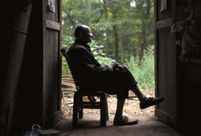 A 90-year-old forester's four decades
A 90-year-old forester's four decades Most touching moments in 2013
Most touching moments in 2013 2013: Joys and sorrows of world politicians
2013: Joys and sorrows of world politicians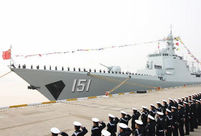 Missile destroyer Zhengzhou commissioned to Chinese navy
Missile destroyer Zhengzhou commissioned to Chinese navy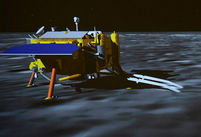 China is technically ready to explore Mars
China is technically ready to explore Mars Photo story: Life changed by mobile technology
Photo story: Life changed by mobile technology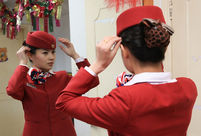 Bullet train attendants' Christmas Eve
Bullet train attendants' Christmas Eve Heart-warming Laba porridge
Heart-warming Laba porridge Gallery: China's trapped icebreaker makes successful escape
Gallery: China's trapped icebreaker makes successful escape Photo story: We are special soldiers
Photo story: We are special soldiers 'Rong' selected HK's character of the year for 2014
'Rong' selected HK's character of the year for 2014 Famous Lanzhou beef noodles
Famous Lanzhou beef noodles Chinese Consulate Arson Suspect Makes 1st Court Appearance
Chinese Consulate Arson Suspect Makes 1st Court AppearanceDay|Week|Month